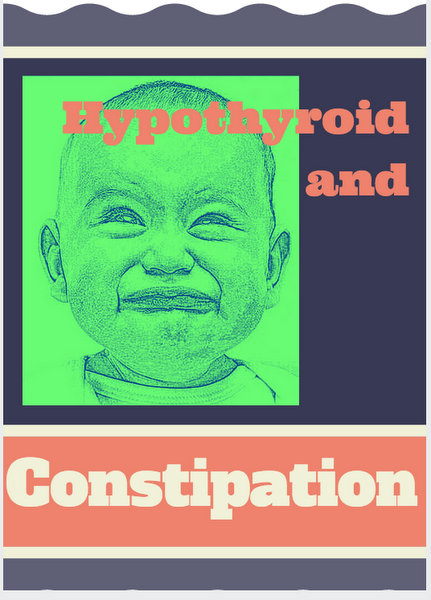 Q: Did you hear about the new movie Constipation?
Q: Did you hear about the new movie Constipation?
A: Yes, it hasn’t come out yet.
Q: Why are hypothyroid patients so mean?
A: Because they don’t give a crap!
Tah-dahhhh. 🙂
Yup, though it’s great fodder for a good laugh ….constipation is the awkward subject of hypothyroidism — i.e. what the condition does to our bowel movements. Patients will report small, round, hard stools, for example. I always and humorously termed them “deer do-do”.
Or they will report not going to the bathroom enough, aka constipation. Or when we’ve finally able to go, our stools can be hard, dry, compacted.
In fact, constipation is said to be the most frequent gastrointestinal complaint a doctor will hear (which makes you wonder how many have undiagnosed hypothyroidism, which is rampant thanks to the use of the lousy TSH lab test).
Why does hypothyroidism cause us to have stool problems?
With any of the following…
- being undiagnosed hypothyroid
- being poorly treated with T4-only meds like Synthroid, levothyroxine, Eltroxin, etc.
- simply not being on enough NDT or T3 due to a TSH-obsessed doctor
…many of us start to notice a change in our stools. Hypothyroidism slows down our internal metabolism, which in turn slows down the elimination process. Those muscles involved in pushing our waste products out via our intestines become sluggish and weaker. And it can be sneaky–coming on slowly and we may not recognize at first that it’s NOT normal.
Additionally, just as our skin and hair can become drier due to our hypo state, there might also not be enough water in our bodies to make our stools softer.
Are there other reasons for constipation?
Other causes can include:
- Being on certain iron supplements like ferrous sulphate
- Not drinking enough fluids
- Certain medications like pain killers, the older tricyclic antidepressants like amitriptyline, some blood pressure meds, etc
- Certain autoimmune diseases like lupus, etc.
- Being too inactive or sedentary
- High intake of cheeses or extremely low-fiber foods
- Obstructions in our intestines
- Intestinal inflammation
- Pregnancy in some
But in hypothyroid patients, the most common cause is our decreased metabolism due to being undiagnosed or poorly treated!
How do I best reverse my constipation/hard stools/infrequent elimination?
Based on reports from thyroid patients all over the world, the first successful way is to get on a better medication, which has proven to be Natural Desiccated Thyroid (NDT). The latter contains the same five hormones that a healthy thyroid produces: T4, T3, T2, T1 and calcitonin. In other words, though the purpose of T4 is to convert to the active T3, being on NDT doesn’t force you to rely on conversion alone, which can have all sorts of problems. Â With NDT, you are also getting some direct T3, just like your own thyroid would have been giving you.
Even if you can’t get it, adding synthetic T3 to that synthetic T4 has done wonders for others.
Thyroid treatment alert: Even if you get on NDT, it’s important to remember that you have to raise high enough. It’s all-too-common for patients to stay too low, either due to a doctor who says “Come back in six weeks (or more)” or a doctor obsessed with keeping you in the erroneous TSH “normal” range, which leaves us hypothyroid. Take the time to study what patients have learned in the proper way to use Natural Desiccated Thyroid, here, and expect to have to guide your doctor!
And if you find that in raising, you start getting strange hyper-like symptoms while you know you are still hypo, time to learn why here. i.e. those hyper-like symptoms are not because NDT doesn’t work–they are because the NDT is revealing one and/or two problems which need treatment.
Eight additional ways to help with constipation
Glad you asked! In addition to improving your thyroid treatment, here are more things you can try and see which works best for YOUR relief…
- Drink more fluids! Those include water, of course, which I personally like adding lemon juice to. Or any other healthful fluid (Sorry, that doesn’t mean more Coca Cola or Dr. Pepper). Other potentially healthy fluids include your favorite herbal teas, or those vegetable juices, or healthy clear soups.
- Move around more if you are able. Being sedentary doesn’t help that metabolism.
- Increase your fiber intake. Depending on what you can or cannot eat, examples of higher fiber foods include beans, bran cereal, whole grain products, veggies like carrots or split peas or lima beans, fruits like raspberries or blackberries…or even flax seed meal or chia seeds added to a food.
- Check out those prunes! Yes, prunes and even prune juice have a great reputation as a great laxative for that constipation. You just have to find the right amount of them. Here’s a study showing the efficacy of using prunes.
- Ask your doctor to try a different medication to see if that helps. It’s known that the old tricyclics for depression can cause constipation, for example. Here’s a list of meds which may cause constipation.
- Adding a magnesium supplement. Â Patients found out that taking magnesium, a mineral known to relax, can help with constipation until other causes are treated. We simply raise it until we find that dose that results in softer stools. We feel it’s wise to test our RBC magnesium to make sure we can handle supplementation.
- Yoga is said to help constipation. I’ve never tried it because NDT did the trick. But this is an interesting idea that certain yoga poses might help a lot. This video (on the top of latter link page) explains.
- Olive oil, yes, olive oil! Â Olive oil is said to lubricate your your intestines and if taken daily (morning and evening), can help move those stools out. Usual recommendations are one tablespoon each time you take it.
Anyhow, hang in there! Oops, nope, that doesn’t work. OK, hang tight!! Oops, no, that doesn’t work either. Let’s just say this….
MORE TO READ:
How hypothyroidism affects motility: https://www.hindawi.com/journals/grp/2009/529802/
